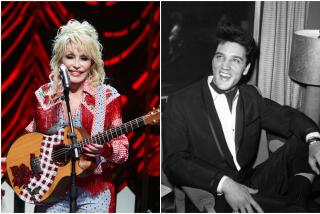TELEVISION REVIEW : Show Looks Into Elvis’ Prime Time : Program to air on PBS stations focuses on 1956, the year Elvis the Singer became Elvis the Commodity.
- Share via
The line that says it all in “Elvis ‘56,” the vibrant documentary about this pivotal year in Presley’s career, is a quote attributed to Col. Tom Parker.
“Son, right now you’ve got a million dollars’ worth of talent,” Parker told Presley just as his star was about to explode. “A year from now, you’ll have a million dollars.”
In other words, 1956 was the year that Elvis the Singer became Elvis the Commodity.
A homey-yet-riveting one-hour program that’s airing next week on many PBS stations during pledge drives (Sunday at 5:30 p.m. and Aug. 23 at 8 p.m. on KOCE Channel 50, Aug. 24 at 9 p.m. on KCET Channel 28), “Elvis ‘56” first surfaced in 1987 as a Cinemax cable special. It’s also available on home video. It’s built mostly around photographs by Alfred Wertheimer from a book by the same name published several years earlier but also includes home-movie-quality film of some early Elvis concerts.
Any of the early years of Elvis’ career could probably have made an equally fascinating focus for the show, but ’56 is chosen because it was the year Elvis made his first recordings for RCA (“Heartbreak Hotel,” “Hound Dog,” “Don’t Be Cruel,” “Love Me Tender,” “Any Way You Want Me,” etc.), his first national television appearances and entered his long-term pact with Hollywood.
It also was the year he hooked up with Col. Parker, who negotiated the deals that led to Elvis becoming the biggest thing to hit America since vulcanized rubber. Ironically, Elvis’ mother, Gladys, the program notes, distrusted Parker and advised her boy not to sign with the Colonel. But “Elvis and his father, Vernon, bit hook, line and sinker,” says narrator Levon Helm. (The Band drummer may be one of rock’s great vocalists, but as a narrator he often sounds like he came straight from remedial reading class.)
For all the embarrassing ways he was subsequently exploited (the Colonel licensed Elvis guitars, makeup cases, record players, necklaces and dog tags), the Elvis of ’56 remains a wonder to behold. For those who may have forgotten, early Elvis was a musical universe removed from the karate-chopping, starched-collar, jewel-encrusted, jump-suited caricature he became in Las Vegas in the 1970s.
Originally, whether singing on national TV or to a hometown-hero’s reception in Memphis, Elvis was the perfect union of musical instinct, emotional inspiration and physical expression.
We see him become the personification of Scotty Moore’s chordal machine-gun bursts of a solo in “Heartbreak Hotel”; singing Little Richard’s “Ready Teddy,” Elvis bulges his eyes in a way that implies anarchy will break loose at any moment.
While this look at Elvis in his prime is mostly a joyful affair, there’s a feeling of melancholy that permeates it. It’s the knowledge that this innocence and and staggering talent will ultimately give way to hucksterism and a tragic decline.
Of course, what happened to Elvis after ’56 isn’t what this show is really about. It’s mostly about the happy days--happier for his fans and maybe the happiest of all for Elvis.
“Elvis ‘56” airs Sunday at 5:30 p.m. and Aug. 23 at 8 p.m. on KOCE Channel 50, Aug. 24 at 9 p.m. on KCET Channel 28.
More to Read
The complete guide to home viewing
Get Screen Gab for everything about the TV shows and streaming movies everyone’s talking about.
You may occasionally receive promotional content from the Los Angeles Times.






